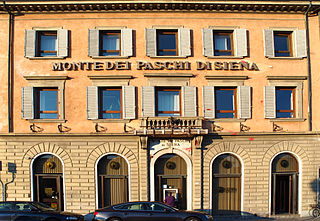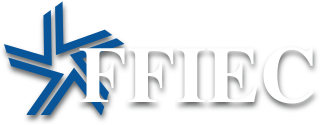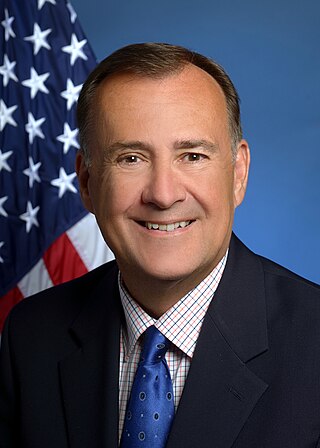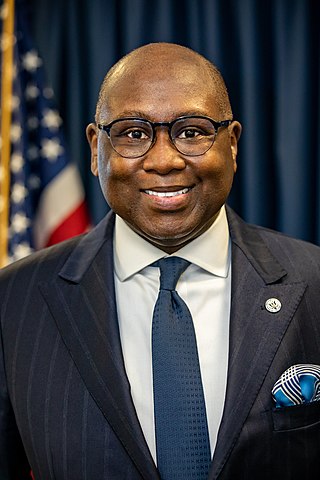
A financial institution, sometimes called a banking institution, is a business entity that provides service as an intermediary for different types of financial monetary transactions. Broadly speaking, there are three major types of financial institution:
- Depository institution – deposit-taking institution that accepts and manages deposits and makes loans, including bank, building society, credit union, trust company, and mortgage broker;
- Contractual institution – insurance company and pension fund
- Investment institution – investment bank, underwriter, and other different types of financial entities managing investments.

The National Credit Union Administration (NCUA) is an American government-backed insurer of credit unions in the United States, one of two agencies that provide deposit insurance to depositors in U.S. depository institutions, the other being the Federal Deposit Insurance Corporation, which insures commercial banks and savings institutions. The NCUA is an independent federal agency created by the United States Congress to regulate, charter, and supervise federal credit unions. With the backing of the full faith and credit of the U.S. government, the NCUA operates and manages the National Credit Union Share Insurance Fund, insuring the deposits of more than 124 million account holders in all federal credit unions and the overwhelming majority of state-chartered credit unions. Besides the Share Insurance Fund, the NCUA operates three other funds: the NCUA Operating Fund, the Central Liquidity Facility (CLF), and the Community Development Revolving Loan Fund (CDRLF). The NCUA Operating Fund, with the Share Insurance Fund, finances the agency's operations.

A savings and loan association (S&L), or thrift institution, is a financial institution that specializes in accepting savings deposits and making mortgage and other loans. The terms "S&L" and "thrift" are mainly used in the United States; similar institutions in the United Kingdom, Ireland and some Commonwealth countries include building societies and trustee savings banks. They are often mutually held, meaning that the depositors and borrowers are members with voting rights, and have the ability to direct the financial and managerial goals of the organization like the members of a credit union or the policyholders of a mutual insurance company. While it is possible for an S&L to be a joint-stock company, and even publicly traded, in such instances it is no longer truly a mutual association, and depositors and borrowers no longer have membership rights and managerial control. By law, thrifts can have no more than 20 percent of their lending in commercial loans—their focus on mortgage and consumer loans makes them particularly vulnerable to housing downturns such as the deep one the U.S. experienced in 2007.
U.S. Central Federal Credit Union was the largest corporate credit union in the United States. Unlike consumer driven credit unions, U.S. Central provided its services only to other corporate credit unions, in effect acting as the "corporate credit union's credit union". The organization was founded in 1974. The organization had to be shut down in 2009 as a result of the 2008 financial crisis. Eventually, Credit Suisse was forced to pay $400 million to resolve claims that it sold faulty mortgage-backed securities to U.S. Central Federal Credit Union.

The Federal Financial Institutions Examination Council (FFIEC) is a formal U.S. government interagency body composed of five banking regulators that is "empowered to prescribe uniform principles, standards, and report forms to promote uniformity in the supervision of financial institutions". It also oversees real estate appraisal in the United States. Its regulations are contained in title 12 of the Code of Federal Regulations.

The Financial Institutions Reform, Recovery, and Enforcement Act of 1989 (FIRREA), is a United States federal law enacted in the wake of the savings and loan crisis of the 1980s.
All regulated financial institutions in the United States are required to file periodic financial and other information with their respective regulators and other parties. For banks in the U.S., one of the key reports required to be filed is the quarterly Consolidated Report of Condition and Income, generally referred to as the call report or RC report. Specifically, every National Bank, State Member Bank and insured Nonmember Bank is required by the Federal Financial Institutions Examination Council (FFIEC) to file a call report as of the close of business on the last day of each calendar quarter, i.e. the report date. The specific reporting requirements depend upon the size of the bank and whether or not it has any foreign offices. Call reports are due no later than 30 days after the end of each calendar quarter. Revisions may be made without prejudice up to 30 days after the initial filing period. Form FFIEC 031 is used for banks with both domestic (U.S.) and foreign (non-U.S.) offices; Forms FFIEC 041 and 051 is for banks with domestic (U.S.) offices only.

Security Service Federal Credit Union (SSFCU) is a credit union headquartered in San Antonio, Texas, federally chartered and federally insured by the National Credit Union Administration (NCUA). With more than $10.5 billion in assets, Security Service serves more than 800,000 members, and operates 66 locations throughout Texas, Colorado and Utah. Security Service is the largest credit union in San Antonio, Texas, and is among the largest credit unions in the United States. The credit union provides access to more than 5,000 credit union locations nationwide through the CU Service Centers shared branching network.

Richard Thomas Metsger served in the Oregon State Senate from 1999 to 2011. President Barack Obama nominated Rick Metsger to serve on the Board of the National Credit Union Administration on May 16, 2013. The U.S. Senate confirmed Mr. Metsger on August 1, 2013, and he took the oath of office on August 23, 2013. He served as the ninth NCUA Board Chairman from May 1, 2016, through January 22, 2017.
The National Credit Union Share Insurance Fund provides deposit insurance to protect the accounts of credit union members at federally insured institutions in the United States. Created in 1970, the Share Insurance Fund is administered by the National Credit Union Administration, an independent federal financial regulator. The Share Insurance Fund is funded completely by participating credit unions, and not one penny of insured savings has ever been lost by a member of a federally insured credit union. The Share Insurance Fund is backed by the full faith and credit of the United States government.
iTHINK Financial was formed in 1969 to serve the employees of IBM. iTHINK Financial is a state chartered, federally insured credit union with more than $1.5 billion in assets and more than 95,000 Members. iTHINK Financial has 22 branches located throughout Florida and Georgia and approximately 380 employees. iTHINK Financial’s headquarters are located in Delray Beach, Florida.
Bank regulation in the United States is highly fragmented compared with other G10 countries, where most countries have only one bank regulator. In the U.S., banking is regulated at both the federal and state level. Depending on the type of charter a banking organization has and on its organizational structure, it may be subject to numerous federal and state banking regulations. Apart from the bank regulatory agencies the U.S. maintains separate securities, commodities, and insurance regulatory agencies at the federal and state level, unlike Japan and the United Kingdom. Bank examiners are generally employed to supervise banks and to ensure compliance with regulations.
The New York State Banking Department was created by the New York Legislature on April 15, 1851, with a chief officer to be known as the Superintendent. The New York State Banking Department was the oldest bank regulatory agency in the United States.

Credit unions in the United States served 100 million members, comprising 43.7% of the economically active population, in 2014. U.S. credit unions are not-for-profit, cooperative, tax-exempt organizations. The clients of the credit unions become partners of the financial institution and their presence focuses in certain neighborhoods because they center their services in one specific community. As of March 2020, the largest American credit union was Navy Federal Credit Union, serving U.S. Department of Defense employees, contractors, and families of servicepeople, with over $125 billion in assets and over 9.1 million members. Total credit union assets in the U.S. reached $1 trillion as of March 2012. Approximately 236,000 people were directly employed by credit unions per data derived from the 2012 National Credit Union Administration (NCUA) Credit Union Directory. As of 2019, there were 5,236 federally insured credit unions with 120.4 million members, and deposits of $1.22 trillion.

Reach Federal Credit Union is a federally chartered credit union for employees of Tyco International, TE Connectivity and Covidien. Reach Federal Credit Union is federally insured and regulated by the National Credit Union Administration (NCUA). Reach Credit Union is headquartered in Menlo Park, California with offices in NC, PA and FL. Like all credit unions, Reach Credit Union is governed by a board of volunteers, elected by and from its membership.

Michael E. Fryzel is an American attorney with offices in Chicago, Illinois. Following the 2016 general election, Fryzel served on President Donald J. Trump's Transition Team and developed the Agency Action Plan for the National Credit Union Administration.

John Mark McWatters is a lawyer, accountant and former board member of the National Credit Union Administration (NCUA). He was appointed by President Donald Trump on June 23, 2017, to serve as the tenth board chairman of the NCUA, and resigned from the NCUA Board on November 20, 2020.

Rodney E. Hood is a member of the National Credit Union Administration board and was the eleventh chairman of the board from 2019 to 2021. Hood was the first African-American to lead a federal banking agency.
The Dodd–Frank Wall Street Reform and Consumer Protection Act was created as a response to the financial crisis in 2007. Passed in 2010, the act contains a great number of provisions, taking over 848 pages. It targets the sectors of the financial system that were believed to be responsible for the financial crisis, including banks, mortgage lenders, and credit rating agencies. Ostensibly aimed at reducing the instability that led to the crash, the act has the power to force these institutions to reduce their risk and increase their reserve capital.











